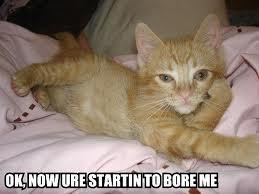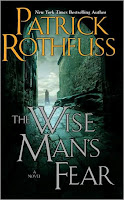 Gabriel is one week old today. La multi ani! So far, so good. He's active and interested in things like simple black & white images, and he's eating like John Belushi at an all-you-can-eat cocaine and heroin buffet. Io, who has taken to calling herself "the Holstein," can barely keep up. But we're getting at least a few hours of sleep every day and each day that goes by is one day closer to Gabriel sleeping and eating on a normal schedule. With our combined brain power, I expect Gabe to be winning Nobel Prizes in a year or two, unless our combined good looks turn him into a movie star first.
Gabriel is one week old today. La multi ani! So far, so good. He's active and interested in things like simple black & white images, and he's eating like John Belushi at an all-you-can-eat cocaine and heroin buffet. Io, who has taken to calling herself "the Holstein," can barely keep up. But we're getting at least a few hours of sleep every day and each day that goes by is one day closer to Gabriel sleeping and eating on a normal schedule. With our combined brain power, I expect Gabe to be winning Nobel Prizes in a year or two, unless our combined good looks turn him into a movie star first.I look like Tom Cruise, you know. From the side.

Is this me? You don't know.

The week has been dominated, not surprisingly, by the new baby, leaving us little time to get much else done. Gagi and I made a second attempt at securing a birth certificate only to be rebuffed yet again by government red tape.
I did, however, have an amazing success negotiating some traveler's checks. I think I wrote before in this blog about how Romania is an all-cash society. Checks simply don't exist here. When it's payday at Tania's work, someone comes by her desk and hands her a wad of bills. When Gagi goes to the government office to collect his pension, they hand him a bunch of cash. Every month when it's time to pay the power bill, a rep from the power company comes around the building and you give him a sack of money. When I was coming out here, Io told me to just bring a ton of cash. But I'm thinking What if I get mugged? What if the house burns down? So I decided to bring half cash, half traveler's checks.
I might as well have brought half cash and half dogshit as far as Romania is concerned. It turns out that traveler's checks are practically non-negotiable here. You'd have more luck spending Monopoly money. I went to three different banks -- banks! -- and all three of them refused to cash my traveler's checks. In America, you can spend traveler's checks at the grocery store. But I finally found a bank that, begrudgingly and with lots of calling the manager and photocopying my passport and glaring at me, agreed to cash some of them.

Here's the thing that's so weird about it: Romania is desperately trying to bring themselves up to the living standards of western Europe, and in particular they are trying to get their tourism industry off the ground. Which you would think wouldn't be that hard, because this country is chock-a-block with gorgeous Renaissance cathedrals, Gothic castles, medieval villages, and beautiful, untouched countryside. But what they don't seem to get is that the reason it's untouched is because it's too difficult for tourists to actually come see the place. Tourists are generally not comfortable carrying around thousands of dollars of cash on their person while in a foreign country. To make this work, you need the infrastructure in place to deal with credit cards, traveler's checks, and the rest of the financial instruments that wealthy western tourists live by. That's my Tip of the Day from me to you, Romania.
Book reviews from March:

Good Omens by Terry Pratchett and Neil Gaiman. Two of my favorite authors taking on the hilarious topic of Armageddon. This is a re-read for me, and I love this book. I particularly like how you can totally tell which aspects of the book were done by Gaiman and which by Pratchett. Heartily recommended.

Me Talk Pretty One Day by David Sedaris. A few years ago I dated a girl named Erica. She was a nice person, but something about her set my teeth on edge. I could never really find a good word to express it, and eventually just started saying she was “too McSweeny’s.” McSweeny’s is a publishing house started by A Heartbreaking Work of Staggering Genius author Dave Eggers, which publishes books in the same style as Dave Eggers’ books. These writers are literary essayists and satirists, fancying themselves modern-day Mark Twains and selling their works mostly to the “This American Life” crowd. Erica wrote in her journal every day no matter what. She kept a diary of all the books she had ever read and what she thought of them. Her apartment had one wall that was covered in pinned-up witticisms and droll quotations, many of them from her herself.
For me, this stuff is just painfully self-conscious. Whenever I read it, I can’t help but imagine the author hunched over a typewriter in a garret apartment (it’s always a typewriter, there’s a whole chapter in Me Talk Pretty One Day not about how typewriters are better than computers, but rather how the author loves typewriters and hates computers) pecking away and laughing to himself, thinking “My God, I am so sardonic.” I think the problem lies mostly in the mistaken thought that even ordinary life moments can be made immensely entertaining if related from the author’s own unique perspective, with his inimitable command of language and unmatched eye for the subsurface dry hilarity in the human condition. They can be, David Sedaris. Just not by you.
 I realize the irony here, harping on McSweenyism in the midst of my own interminable writing about my life. Hell, I am criticizing a woman for keeping notes about all the books she read during a book review on my blog. I like to think that the sardonicness is now squared, and goes so far that it comes back around to being entertaining again.
I realize the irony here, harping on McSweenyism in the midst of my own interminable writing about my life. Hell, I am criticizing a woman for keeping notes about all the books she read during a book review on my blog. I like to think that the sardonicness is now squared, and goes so far that it comes back around to being entertaining again.But on to the book. It’s divided into two halves: the first part is about Sedaris’s youth and young adulthood in North Carolina and Manhattan. The second half is about his life as an expatriate in Paris. The first half of the book is excruciatingly McSweeny, made worse by the fact that the author is really a pretty awful person, with a family of mostly awful people, and a bunch of awful person friends. Here a chapter about how funny it was when he spent years on crystal meth and coke; there a chapter about how his mother had to put down her beloved cat after it came down with feline leukemia, and a week afterwards Sedaris and his sister mailed her a fake letter announcing that a cure for feline leukemia had been discovered. None of this stuff is funny or even really that interesting, and Sedaris is no Twain.
The person who bought me the book -- a good friend of mine who is so authentic she’s like the anti-McSweeny -- bought it for me because she thought I would find the expat stuff in the second half of the book relatable and funny, since I was getting ready to head off to Bucharest at the time. And she’s right about that. The back half is really pretty good, because here Sedaris is talking about stuff that is interesting and funny in and of itself: his experiences with culture clash and trying to learn French, and observations about Paris that are interesting to someone with an American perspective. He’s still no Twain, but now his good ear for humor is enough to carry the day.
So, in the end, I recommend half of this book.

The Wise Man's Fear by Patrick Rothfuss. Last year my friend Steve Heller recommended a book called The Name of the Wind. I read it and enjoyed it quite a bit, and then discovered that Steve had recommended me a book that was first in a trilogy with neither of the other two books having been written yet. Bastard! Book 2 was just released, and in an amazing display of futuristic technology I saw a blurb about it on Amazon and two minutes later I was reading the book on Io's Kindle in Bucharest. Wow. The book is a pretty compelling read, even though in the end it doesn't really advance any of the plot threads that were introduced in book 1. Definitely worth reading.
And now, it's on to Week Two of my brand-new life as a father. I haven't totally screwed up Gabriel's life yet. 935 weeks to go.

No comments:
Post a Comment